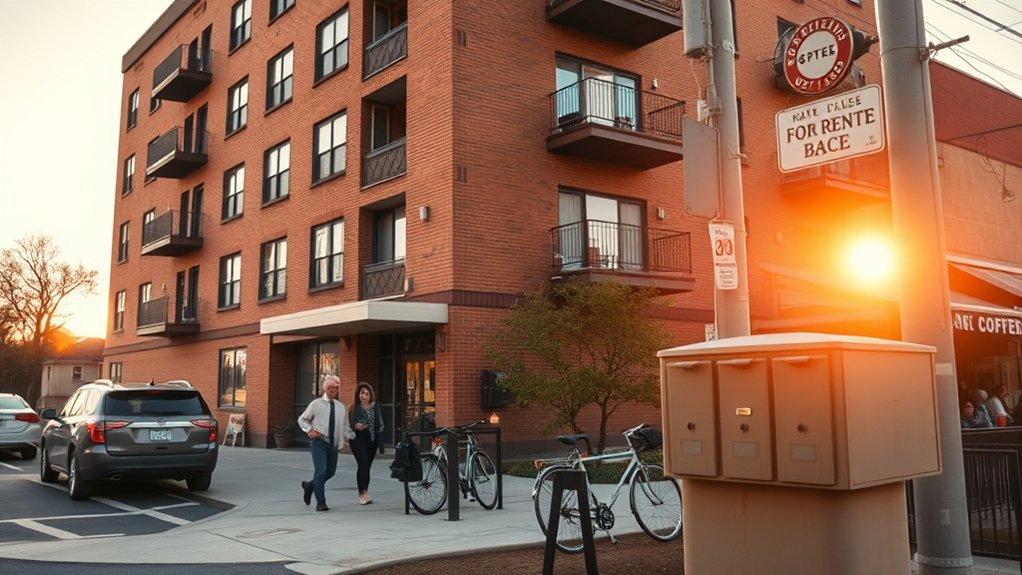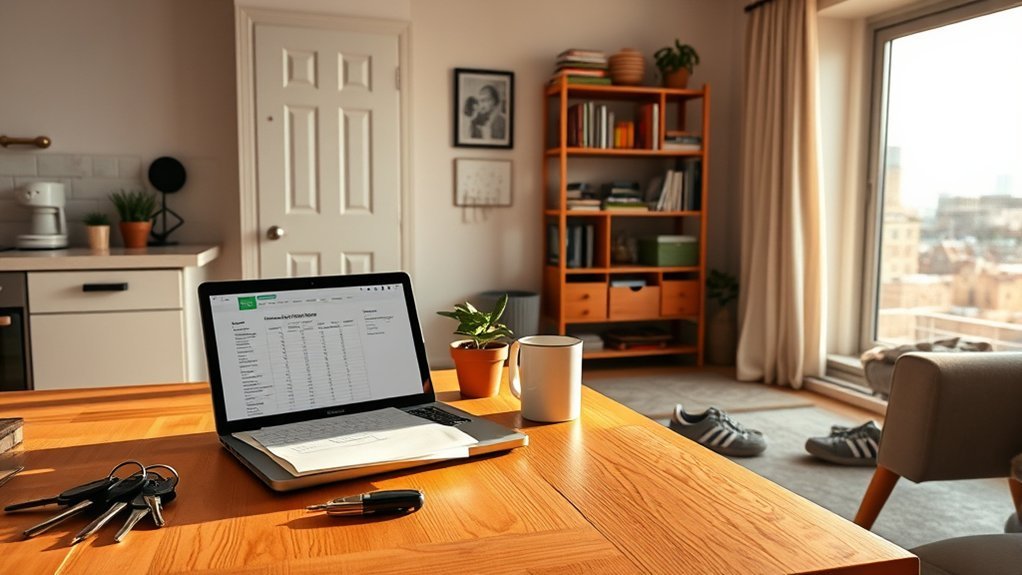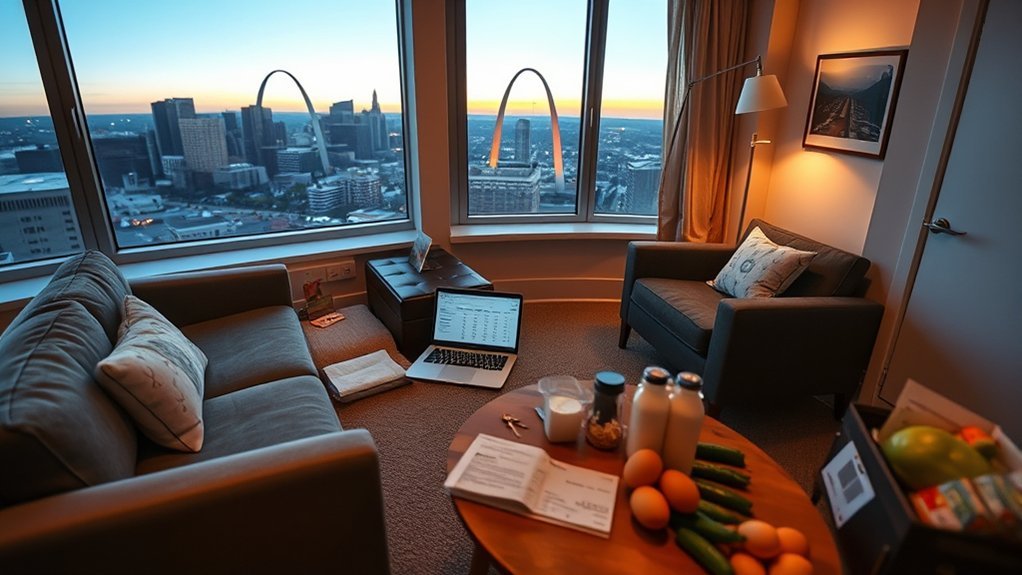You might not know St. Louis’s overall cost of living runs about 11% below the U.S. average, yet one‑bedroom rents can still vary from under $900 to around $1,100 depending on neighborhood. If you’re planning a budget, you’ll want clear monthly figures for rent, groceries, utilities, transportation and healthcare to avoid surprises — and there are a few specific numbers that will change how you plan your salary.
Cost of Living Overview for St. Louis, MO

Although St. Louis’s cost of living sits about 11% below the U.S. average (overall index ≈ $210.58), you’ll still want to plan precisely. Your monthly rent typically ranges from roughly $1,127 to $1,412, about 30.8% below national norms, and housing prices for listed homes average near $423–427K, roughly 18–22% less than the U.S. median.
A recommended comfortable pre-tax salary for a single adult is about $48,360, reflecting suggested annual housing costs near $18,240. Major recurring categories are generally cheaper: healthcare ~12% lower, utilities ~3–4% lower, transportation ~6–7% lower, and groceries and utilities together trend near national parity or slightly below (groceries roughly 1% lower).
These data show housing drives most variance in average household income needs and monthly outlays. Additionally, when considering building a house, it’s crucial to factor in the significant costs associated with construction, which can vary widely based on materials and location. Use these figures to model your budget, prioritizing housing costs first since they produce the largest impact on total monthly expenses.
Monthly Budget Examples by Household Type

Now that you’ve seen how housing and basic expenses compare to national norms, let’s look at what that means for real monthly budgets by household type.
If you’re a single renter, plan for about $4,030/month in monthly expenses — roughly 15.4% below the national average — driven by lower average rent in St. Louis (about $1,127).
As a typical homeowner, expect around $7,585/month, with owner housing costs near $1,853/month, reflecting St. Louis cost of living advantages versus the U.S.
For a married couple with young kids (under 6) budget about $6,829/month, while couples with children 6–17 average $7,889/month.
Use these figures to model your household budget and prioritize essentials: housing, childcare, food, transport, and healthcare.
If you’re a single adult aiming for comfortable finances here, target the recommended salary of roughly $48,360/year to cover the suggested single-adult housing cost and other monthly expenses. Additionally, consider budgeting for operating expenses that may arise in your financial planning to ensure a well-rounded budget.
Housing: Rent, Home Prices and Mortgage Costs

You’ll find average rents in St. Louis around $1,100–$1,400/month depending on the source and neighborhood, with typical one-bedrooms nearer $866–$971. Buying is generally cheaper than the U.S. average too, with listing prices around $423K–$428K (about 18% below national) and homeowner payments roughly $1,853/month. Compare those figures against a current mortgage rate near 6.6% and your local neighborhood costs to decide whether renting or buying makes more financial sense for you. Understanding potential hidden costs can also influence your decision on housing options.
Average Rent Levels
Rent in St. Louis runs noticeably lower than many U.S. cities. You’ll find rent in Saint Louis averages about $1,127/month, roughly 30.8% below the national average.
Local reports show a typical average monthly rent near $1,412, with one-bedroom medians around $971 and two-bedroom medians near $1,242 — numbers vary by neighborhood and data source.
Housing costs overall are about 20–22% cheaper than the U.S. average, making rent a major factor in the region’s lower cost of living.
For budgeting, analysts suggest roughly $18,240 per year for single-adult housing, implying a comfortable pre-tax salary near $48,360 to cover housing without excess strain.
Buying vs. Renting
Thinking of whether to buy or keep renting in St. Louis, you should compare clear numbers. Rent averages about $1,127/month (some sources cite $1,412), roughly 20–31% below national figures, so renting keeps housing costs lower upfront. House prices average near $423,329–$427,558, about 18–22% below the U.S. average, making purchase attractive if you plan to stay put.
With mortgage rates near 6.60%, monthly payments on a median-priced home will be substantially higher than rent initially, and you’ll add taxes, insurance, and maintenance. Use the 30% rule: rent should be no more than 30% of gross income to be affordable. If your gross income supports mortgage and total housing costs, buying can build equity; otherwise keep renting.
Groceries and Typical Food Prices

Groceries in St. Louis are roughly 1.1% below the national average, so your food budget stretches a bit farther. You’ll see Food costs that keep the average cost of groceries manageable: typical renters spend about $686 per month on groceries, roughly 0.9% below the U.S. average.
Common prices you can expect: a dozen eggs ≈ $3.37, a gallon of milk ≈ $4.67, a loaf of bread ≈ $3.66, ground beef ≈ $7.09/lb, and steak ≈ $15.51.
Produce is generally affordable — bananas about $0.75/lb and lettuce ≈ $1.88 — and staples like cooking oil run near $8.62.
For beverages, coffee to-go averages $5.05 and orange juice ≈ $4.43.
These prices show you practical, local grocery prices and help you plan monthly spending. Track weekly receipts to adjust your per month grocery estimate based on dietary choices and shopping habits.
Utilities and Monthly Household Bills

After you’ve mapped out food costs, plan for monthly utilities, which typically add about $219 for a ~915 sq ft apartment in St. Louis.
You’ll find that total utilities (electricity, heating, cooling, water, garbage) run roughly 2% below the U.S. average, but telecom can push your bills higher. Use these figures to build a realistic budget:
- Electricity: expect about $114–$151 per month depending on apartment size and season.
- Gas: plan for roughly $56–$63 monthly for heating and cooking if applicable.
- Energy category: combined energy costs average $190–$194/month locally (≈8% below national).
- Phone/Internet: budget about $203–$204/month — telecom costs are roughly 4% above the national average.
These utilities apply to renters and homeowners alike and are tracked quarterly by C2ER and local reports (latest aggregated data published September 2025). Regular inspections of your air conditioning system can help prevent costly repairs and ensure efficient performance.
Tally these into housing, groceries, transportation, and healthcare for a complete cost picture.
Healthcare Costs and Common Medical Expenses

While healthcare in St. Louis runs about 12% below the national average, you’ll still want to budget carefully.
Local doctor visit costs average $92–$94, making routine checkups significantly cheaper than many metros.
Outpatient visit prices for dentists and optometrists are also affordable — roughly $116 and $95 respectively — so routine care rarely breaks the bank.
For planning, average healthcare spending is about $3,200 per single adult annually and roughly $8,600–$8,700 for a family of four.
Over-the-counter items and prescription drug costs tend to be modest; expect common OTC pain relievers around $11 and prescription drug costs near $21.65 for typical fills.
Emergency and specialty pricing can vary, but the region’s lower healthcare index generally translates to lower out-of-pocket bills compared with many U.S. cities.
Use these figures to estimate monthly allocations and compare insurance options to minimize unexpected expenses.
Transportation: Gas, Public Transit and Auto Costs

How will you get around St. You’ll weigh driving versus transit when estimating transportation costs. Gasoline prices run about $3.26–$3.30 per gallon, ~2% below the national average, so fuel is modestly cheaper. Overall transportation is roughly 6–7% cheaper than the U.S. average, reflecting lower commuting and upkeep.
- Visualize filling up: $3.26–$3.30/gal for routine trips and errands.
- Picture routine service: a tire rotation costs about $63.80, an example of local vehicle maintenance prices.
- Imagine taking transit: public transit can cut monthly costs compared with solo driving, especially if you avoid parking and fuel.
- Scale to a year: regional budgeting puts annual commuting expenses roughly between $5,300 and $10,200 depending on miles, transit use, and maintenance frequency. Additionally, it’s important to consider potential exhaust leak repair costs that may arise from regular vehicle use.
Use these data points to compare scenarios — daily driver, mixed-mode commuter, or transit-focused — and estimate your budget precisely.
Goods, Services and Lifestyle Expenses

You’ll find everyday services and entertainment in St. Louis generally cheaper than many U.S. cities. The metro’s cost of living index reflects about an 11% lower overall cost, with goods & services running roughly 8.9–10% below the national average. That translates to about $960/month for a typical mix of personal services and entertainment.
Everyday services and entertainment in St. Louis run about 8–11% cheaper — roughly $960/month for typical personal services.
Practical examples: a haircut averages about $21.60–$21.91 (≈17% below U.S.) and dry cleaning around $14.90–$15.14 (≈12% below U.S.).
Entertainment costs are modest — movie tickets near $12.16–$12.65 and yoga classes around $19.15–$19.18 — so leisure won’t eat your budget. Additionally, the local economy benefits from revenue generation strategies that help keep costs low for residents.
One notable exception: monthly phone bills trend slightly higher than average, reported near $190–$204.
What Salary You Need to Live Comfortably in St. Louis

To live comfortably in St. Louis you’d aim for about $48,360 pre-tax per year, which assumes roughly $18,240 in annual housing costs.
That figure reflects local savings — overall cost of living is ~11% below the U.S. average and rent averages about $1,127/month — so your paycheck goes further here.
A practical budget splits monthly expenses around $4,030 for a renter (or about $7,585 if you’re a homeowner), with healthcare, utilities, and goods/services typically costing less than the national averages. Additionally, cost factors like unexpected repairs can impact your overall budget, so it’s wise to account for those expenses.
Comfortable Salary Estimate
Crunch the numbers and you’ll see that a comfortable pre-tax salary for a single adult in St. St. Louis should be about $48,360 annually.
You’ll benefit from St. Louis’s cost of living being ~11% below the national average, which lowers the income needed to cover housing costs and monthly expenses.
Housing is the biggest factor — average rent ~$1,127/month, home listing ~$423,329 — and is roughly 20–22% cheaper than the U.S. average.
Lower costs in healthcare, utilities, transportation and goods further reduce needs.
Picture what that salary supports:
- A stable one-bedroom rental near amenities.
- Routine healthcare and modest savings.
- Reliable utilities, transport and groceries.
- Occasional dining and small discretionary spending.
Budget Breakdown by Category
While housing will drive most of your budget, a clear category-by-category split shows how a comfortable $48,360 pre-tax salary maps to monthly needs: housing roughly $1,520 (we used the suggested $18,240/year or about $1,520/month), transportation $400, groceries $300, healthcare $200, utilities $150, insurance and taxes $600, savings $400, and discretionary/other $460 — totaling about $4,030/month, which aligns with renter budgets in St.
You’ll see St. Louis’s cost of living advantage in housing costs and utilities, which trend below U.S. averages. Compared with national medians, your monthly budget stretches further here: housing is ~20–22% cheaper, healthcare ~12% cheaper, and goods/services ~9–10% cheaper.
If you compare this to median household income and the 30% rent rule, a one-bedroom suggests gross needs around $3,240–$3,757/month. Use these category figures to plan savings and hit local financial goals without overstating expenses.
Frequently Asked Questions
How Much Do You Need to Live Comfortably in St. Louis?
You need about $48,360 pre-tax annually to live comfortably in St. Louis. That covers typical rent, groceries, utilities, transport, and healthcare, given local costs are generally below national averages. Plan a modest buffer.
What Is the Average Cost of Living per Month in Missouri?
Think of Missouri as a steady river: you’ll need about $4,030 monthly as a typical single renter, or roughly $7,585 if you’re a homeowner; overall costs run near 11% below the U.S. average.
What Is the Average Cost of Housing in St. Louis MO?
The average housing cost in St. Louis is about $1,127/month for rent; homeowners face roughly $1,853/month in housing costs, and median listing prices are around $423,329, all considerably below national averages.
Is St. Louis an Affordable Place to Live?
Yes — you’ll laugh at sky‑high rents elsewhere while enjoying about 11% lower overall costs; housing’s the big win (rent ≈ $1,127), and healthcare, utilities, transport and goods are modestly cheaper, so your budget stretches further.
Conclusion
St. Intractably affordable compared with many U.S. cities, St. Louis still needs sensible budgeting: expect about $1,127 for average rent, total monthly bills near $4,030 for a single renter, and a comfortable pre‑tax salary around $48,360. You’ll cover housing, groceries, transport, healthcare and savings if you plan with these numbers. Don’t underestimate small expenses — they’ll surprise you like a thunderclap — but with data‑driven planning you can live well here without breaking the bank.


